PHP PHPMailer邮件
autofelix 人气:0导语
〝 古人学问遗无力,少壮功夫老始成 〞
随着企业化的管理越来越规范,各种项目管理系统中,都需要加入到邮件实时通知功能,所以在项目中如何整合发邮件功能,其实是很重要的一点。如果这篇文章能给你带来一点帮助,希望给飞兔小哥哥一键三连,表示支持,谢谢各位小伙伴们。
一、安装环境
PHPMailer 需要 PHP 的 sockets 扩展支持
另外登录 QQ 邮箱 SMTP 服务器则必须通过 SSL 加密的, PHP 还得包含 openssl 的支持
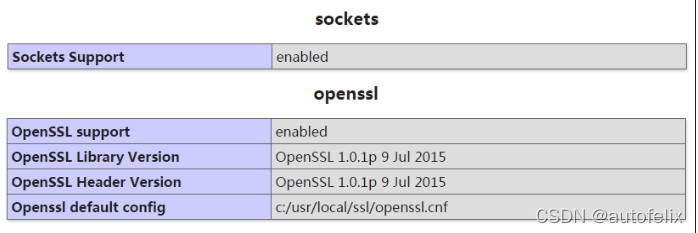
二、下载
地址: https://github.com/PHPMailer/PHPMailer/
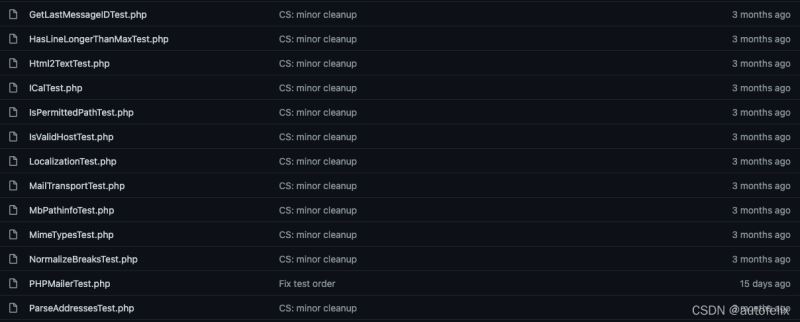
三、 邮箱设置
所有的主流邮箱都支持 SMTP 协议,但并非所有邮箱都默认开启
您可以在邮箱的设置里面手动开启
第三方服务在提供了账号和密码之后就可以登录 SMTP 服务器
通过它来控制邮件的中转方式
SMTP 服务器认证密码,需要妥善保管
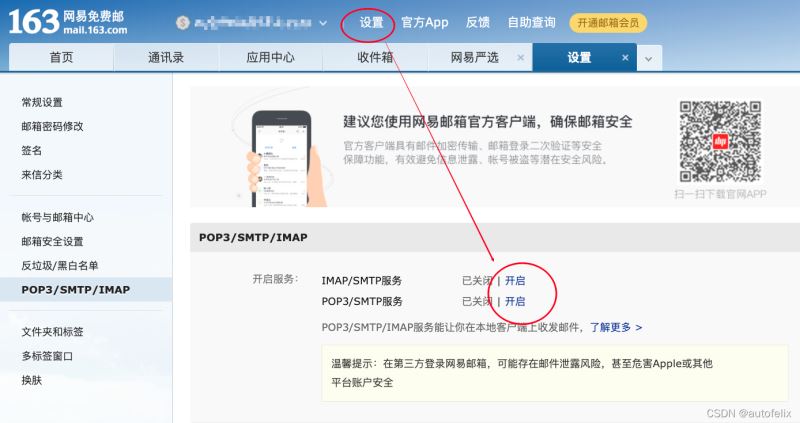
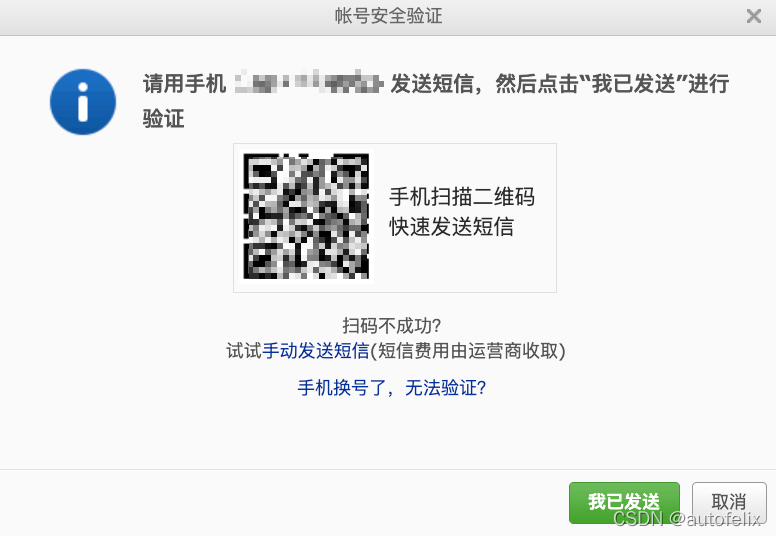
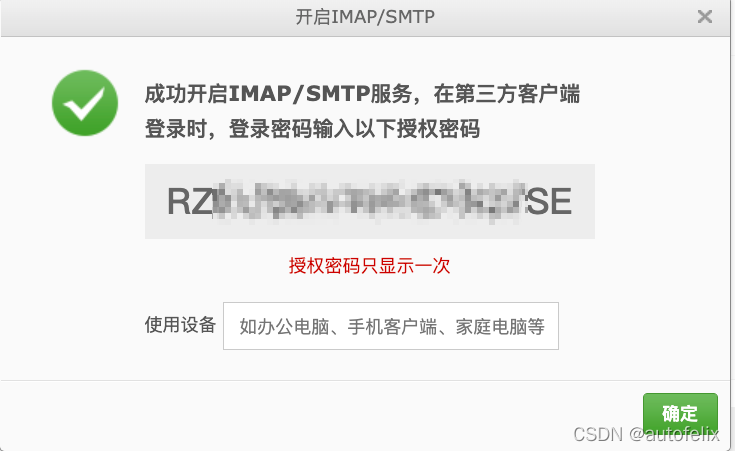
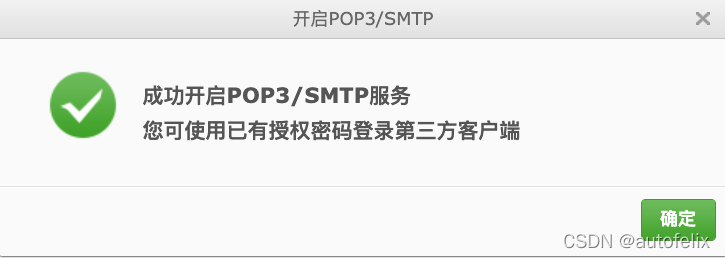
四、php发送邮件
<?php
// 引入PHPMailer的核心文件
require_once("PHPMailer/class.phpmailer.php");
require_once("PHPMailer/class.smtp.php");
// 实例化PHPMailer核心类
$mail = new PHPMailer();
// 是否启用smtp的debug进行调试 开发环境建议开启 生产环境注释掉即可 默认关闭debug调试模式
$mail->SMTPDebug = 1;
// 使用smtp鉴权方式发送邮件
$mail->isSMTP();
// smtp需要鉴权 这个必须是true
$mail->SMTPAuth = true;
// 链接qq域名邮箱的服务器地址
$mail->Host = 'smtp.qq.com';
// 设置使用ssl加密方式登录鉴权
$mail->SMTPSecure = 'ssl';
// 设置ssl连接smtp服务器的远程服务器端口号
$mail->Port = 465;
// 设置发送的邮件的编码
$mail->CharSet = 'UTF-8';
// 设置发件人昵称 显示在收件人邮件的发件人邮箱地址前的发件人姓名
$mail->FromName = '发件人昵称';
// smtp登录的账号 任意邮箱即可
$mail->Username = 'xxxxxxx@163.com';
// smtp登录的密码 使用生成的授权码
$mail->Password = '**********';
// 设置发件人邮箱地址 同登录账号
$mail->From = 'xxxxxxx@qq.com';
// 邮件正文是否为html编码 注意此处是一个方法
$mail->isHTML(true);
// 设置收件人邮箱地址
$mail->addAddress('xxxxxxxxx@qq.com');
// 添加多个收件人 则多次调用方法即可
$mail->addAddress('xxxxxxxxx@163.com');
// 添加该邮件的主题
$mail->Subject = '邮件主题';
// 添加邮件正文
$mail->Body = '<h1>Hello, i am autofelix</h1>';
// 为该邮件添加附件
$mail->addAttachment('./附件.pdf');
// 发送邮件 返回状态
$status = $mail->send();
五、php框架中使用
先使用composer进行安装:composer require phpmailer/phpmailer ^6.5
使用
<?php
use PHPMailer\PHPMailer\PHPMailer;
use PHPMailer\PHPMailer\SMTP;
use PHPMailer\PHPMailer\Exception;
class mail
{
public function send()
{
//Create an instance; passing `true` enables exceptions
$mail = new PHPMailer(true);
try {
//Server settings
$mail->SMTPDebug = SMTP::DEBUG_SERVER; //Enable verbose debug output
$mail->isSMTP(); //Send using SMTP
$mail->Host = 'smtp.example.com'; //Set the SMTP server to send through
$mail->SMTPAuth = true; //Enable SMTP authentication
$mail->Username = 'user@example.com'; //SMTP username
$mail->Password = 'secret'; //SMTP password
$mail->SMTPSecure = PHPMailer::ENCRYPTION_SMTPS; //Enable implicit TLS encryption
$mail->Port = 465; //TCP port to connect to; use 587 if you have set `SMTPSecure = PHPMailer::ENCRYPTION_STARTTLS`
//Recipients
$mail->setFrom('from@example.com', 'Mailer');
$mail->addAddress('joe@example.net', 'Joe User'); //Add a recipient
$mail->addAddress('ellen@example.com'); //Name is optional
$mail->addReplyTo('info@example.com', 'Information');
$mail->addCC('cc@example.com');
$mail->addBCC('bcc@example.com');
//Attachments
$mail->addAttachment('/var/tmp/file.tar.gz'); //Add attachments
$mail->addAttachment('/tmp/image.jpg', 'new.jpg'); //Optional name
//Content
$mail->isHTML(true); //Set email format to HTML
$mail->Subject = 'Here is the subject';
$mail->Body = 'This is the HTML message body <b>in bold!</b>';
$mail->AltBody = 'This is the body in plain text for non-HTML mail clients';
$mail->send();
echo 'Message has been sent';
} catch (Exception $e) {
echo "Message could not be sent. Mailer Error: {$mail->ErrorInfo}";
}
}
}加载全部内容